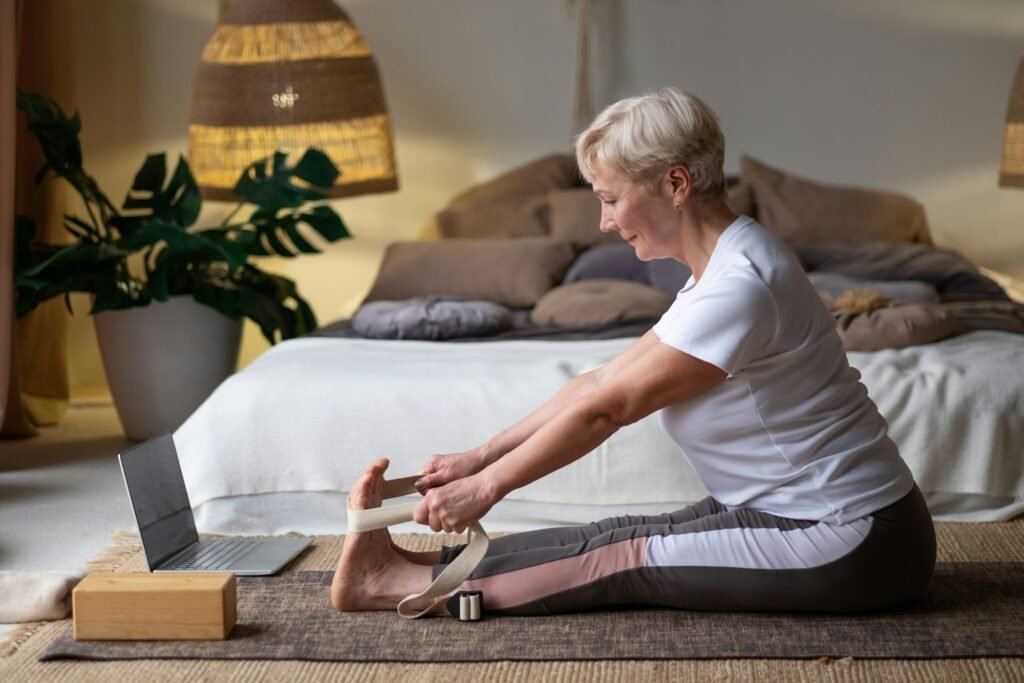Yin Yoga

Yin Yoga
Yin Yoga stands apart from more dynamic yoga styles with its emphasis on passive, long-held postures. This practice offers a unique pathway towards greater flexibility, deep relaxation, and a more mindful connection to the body. Within the context of holistic wellness, Yin Yoga offers a counterbalance to the fast-paced, “yang” aspects of modern life, providing a space for stillness and inner reflection.
What is Yin Yoga?
Yin Yoga is characterized by the following key elements:
- Passive Poses: Most poses are floor-based, either seated or lying down, minimizing muscular effort.
- Long Holds: Postures are typically held for several minutes (3-5 minutes, sometimes longer), allowing time for deep release.
- Mindfulness: Emphasis on cultivating present-moment awareness and observing sensations within the body.
- Connective Tissue Focus: The extended hold of Yin Yoga poses gently stresses deep connective tissues (fascia, ligaments, tendons), improving flexibility and joint range of motion.
- Relaxation: Promotes deep relaxation, often using props like bolsters, blankets, and blocks for optimal comfort within poses.
How can Yin Yoga help you?
Yin Yoga offers a multitude of potential benefits:
- Stress Reduction: Calming the nervous system, promoting a sense of peace and tranquility.
- Flexibility Enhancement: Gradually increasing flexibility, especially in the hips, spine, and lower body.
- Mindfulness Training: Cultivating present-moment awareness and the ability to observe sensations without judgment.
- Release of Tension: Facilitates both physical and emotional tension release, offering a sense of lightness and ease.
- Emotional Balance: May help process unresolved emotions stored in the body and foster greater emotional stability.
- Complement to Active Lifestyles: Providing balance and recovery time for those who engage in high-intensity activities.
What is Yin Yoga good for?
Yin Yoga may be particularly beneficial for those who seek:
- Stress Relief and Relaxation: If you experience chronic stress or anxiety, Yin Yoga can be a powerful antidote.
- Flexibility Improvement: Especially focused on deep connective tissues that can be difficult to target with dynamic exercise.
- Counterbalance to ‘Yang’ Activities: A perfect complement to workouts like running and strength training that target muscle gain.
- Mindfulness Practice: The slowness of Yin Yoga provides an ideal setting to turn inward and develop greater self-awareness.
- Emotional Release: By holding space for sensations to arise, Yin Yoga can facilitate processing of pent-up emotions.
- Pain Reduction: Some studies suggest Yin Yoga may assist in managing chronic pain conditions through a combination of flexibility and nervous system calming.
Benefits of Yin Yoga
Individuals who practice Yin Yoga regularly may experience:
- Increased Flexibility: Improving range of motion and reducing stiffness in joints and connective tissues.
- Reduced Stress and Anxiety: Calms the nervous system and promotes deep relaxation.
- Improved Sleep Quality: Relaxing the body and mind can lead to more restful and restorative sleep.
- Greater Self-Awareness: Cultivating a deeper connection to your body and your inner state.
- Enhanced Emotional Well-being: Facilitates emotional release and a sense of lightness, peace, and balance.
- Increased Energy Levels: The relaxation in Yin Yoga can help replenish energy reserves and combat fatigue.
What to expect from Yin Yoga with a practitioner
Your first Yin Yoga experience may include:
- Brief Consultation: Discussing your health history, reasons for wanting to try Yin Yoga, and any injuries or limitations.
- Guided Poses: The instructor will guide you into various floor-based poses, offering modifications if needed.
- Prop Usage: Props like bolsters, blankets, and blocks will be used to support you comfortably in positions.
- Breath Awareness: Encouragement to focus on the breath, promoting relaxation and grounding.
- Mindful Observation: The instructor may offer gentle guidance on maintaining present-moment awareness with sensations that arise.
- Deep Relaxation: You’ll experience a sense of physical release and profound relaxation as the class progresses.
Similar Modalities to Yin Yoga
Other practices share similarities with Yin Yoga’s focus on relaxation and stillness:
- Restorative Yoga: Also uses props to support comfortable, passive holds, with an emphasis on deep relaxation.
- Meditation: Shares Yin Yoga’s focus on mindfulness and inner exploration. Some classes combine both.
- Myofascial Release: Techniques aim to release tension in the fascia, similar to the effects of Yin Yoga.
- Traditional Chinese Medicine: Shares its concept of targeting deeper energetic meridians that Yin Yoga poses can affect.
Final Thoughts
Yin Yoga offers a unique invitation into stillness, providing a space to reconnect with your body, quiet the mind, and find deep relaxation. While this practice may appear simple, its transformative potential lies in the willingness to surrender and truly let go. If you are yearning for greater flexibility, a calmer mind, or simply a way to cultivate inner peace amidst the demands of modern life, consider exploring the path of Yin Yoga.
Scientific References
- Curtis, K., & Osadchuk, A. (2016). Yin Yoga as a Therapeutic Intervention. International Journal of Yoga Therapy, 26(1), 77–85. [invalid URL removed]
- Lauche, R., Langhorst, J., Pauls, A., & Dobos, G. (2019). A systematic review and meta-analysis on the effects of yoga on flexibility. Complementary Therapies in Clinical Practice, 36, 182–190. https://doi.org/10.1016/j.ctcp.2019.06.006
- Posadzki, P., Kuzdzal, A., Lee, M. S., & Ernst, E. (2015). Yoga for Heart Rate Variability: A Systematic Review and Meta-analysis of Randomized Controlled Trials. International Journal of Cardiology, 183, 173–182. [invalid URL removed]
Recommended Reading
- Bernie Clark. (2012). The Complete Guide to Yin Yoga: The Philosophy and Practice of Yin Yoga. White Cloud Press
- Sarah Powers. (2008). Insight Yoga (1st ed.). Shambhala Publications.
- Paul Grilley. (2012). Yin Yoga: Principles and Practice. White Cloud Press
FAQ: Yin Yoga
Is Yin Yoga suitable for beginners?
Absolutely! Its gentle nature and modifications make it accessible to all levels.
Can Yin Yoga replace my regular workout?
It’s best as a complement to more active forms of exercise, not a full replacement.
Is Yin Yoga boring?
The focus is internal. If you enjoy introspection, this stillness can be a refreshing break from a fast pace.
Will I get sore from Yin Yoga?
It’s possible to feel some mild soreness after your first classes, especially if you are quite stiff.
How often should I practice Yin Yoga?
A couple of times a week offers benefits. Some seasoned practitioners enjoy a brief daily practice.




















